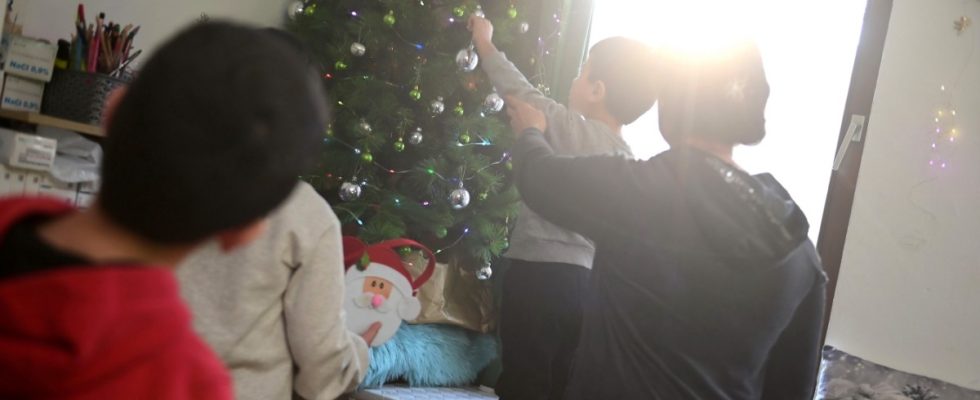Emilia, Johannes and Simon love the dates and nuts baked in yeast dough and the intense taste of cardamom. This time, her mom didn’t bake the Christmas cookies from her Iraqi homeland for the children in her own oven in the tiny kitchen because it no longer heats properly. Instead, Veronika Hanna was allowed to put the cookies in a friend’s house. So the family has something to snack on in front of the Christmas tree, where green and silver balls are already glittering. It stands in the corner of the room and is out of the way when the single mother spreads out the four sleeping mattresses in the 25 square meter one-room apartment every evening.
The confinement is a daily strain. Veronika Hanna puts it in a less judgmental way: “So that Emilia has peace and quiet to study, she often goes into the bathroom with her school supplies and uses the washing machine as a table.” The ten-year-old has been attending high school since this year and the eight and six-year-old brothers don’t give up. The middle one, Johannes, “is always so angry.” His prevailing mood since the family’s devastating separation from his father five years ago.
The self-professed Christian from Mosul, Iraq, lived with her family in Baden-Württemberg and moved with her children to live with her brother in Munich after the marriage broke up. “There was violence involved,” says the woman with long brown hair, who studied computer science in Iraq but followed her husband to Germany before graduating because of the war.
What also makes Johannes angry is what makes his big sister Emilia cry: “At school they said that we get our money from the job center and that we are poor. The children are ashamed.” The feeling of not being able to keep up with your classmates is torture. That is also the reason why the four in this article wanted to have a different name, says Veronika Hanna.
Simon, the youngest, is plagued by something else: the first grader suffers from chronic bronchitis, the mucus on his lungs has to be sucked out several times a day, he has physiotherapy once a week and he goes to the hospital regularly for check-ups. “It’s all stressful,” says his mother. Only when asked did she talk about her chronic knee and spine pain, and the cold that didn’t go away for a year after her corona illness.
There’s a rustling on the phone. Because of the masses of snow in Munich, the conversation cannot take place in the family’s apartment, but only by telephone. Veronika Hanna leafs through forms that document what she and her children live on: citizen’s benefit from the job center, child benefit, the father doesn’t pay maintenance. She has a hard time sorting everything out. “The family lives in very modest circumstances,” their supervisor told the city’s advice center for parents, children and young people in advance. “Every additional payment burden for pocket money for school trips and materials at school, clothing, additional health expenses and rising energy costs puts a strain on the mother and the children.” The 43-year-old queues up for food at the food bank every two weeks.
The Iraqi native says her daughter urgently needs a desk, a laptop for school, and the boys need winter clothes for soccer training, both of whom have recently joined the club. Veronika Hanna cooks a lot “from home, I can do that for the children”. A freezer would help her keep large quantities of food fresh and heat it up quickly when she gets home from her many doctor’s appointments. And soon perhaps from work too – she wants to earn her own money and has just successfully completed the required advanced language course.
And they would need an oven too. At Christmas we traditionally have peas and beef after going to church. Afterwards there is singing in the language of Jesus, Hanna’s mother tongue, Aramaic. The 43-year-old laughs into the phone for the first time. A girl laughs: “In Mosul I was in the church choir.”

